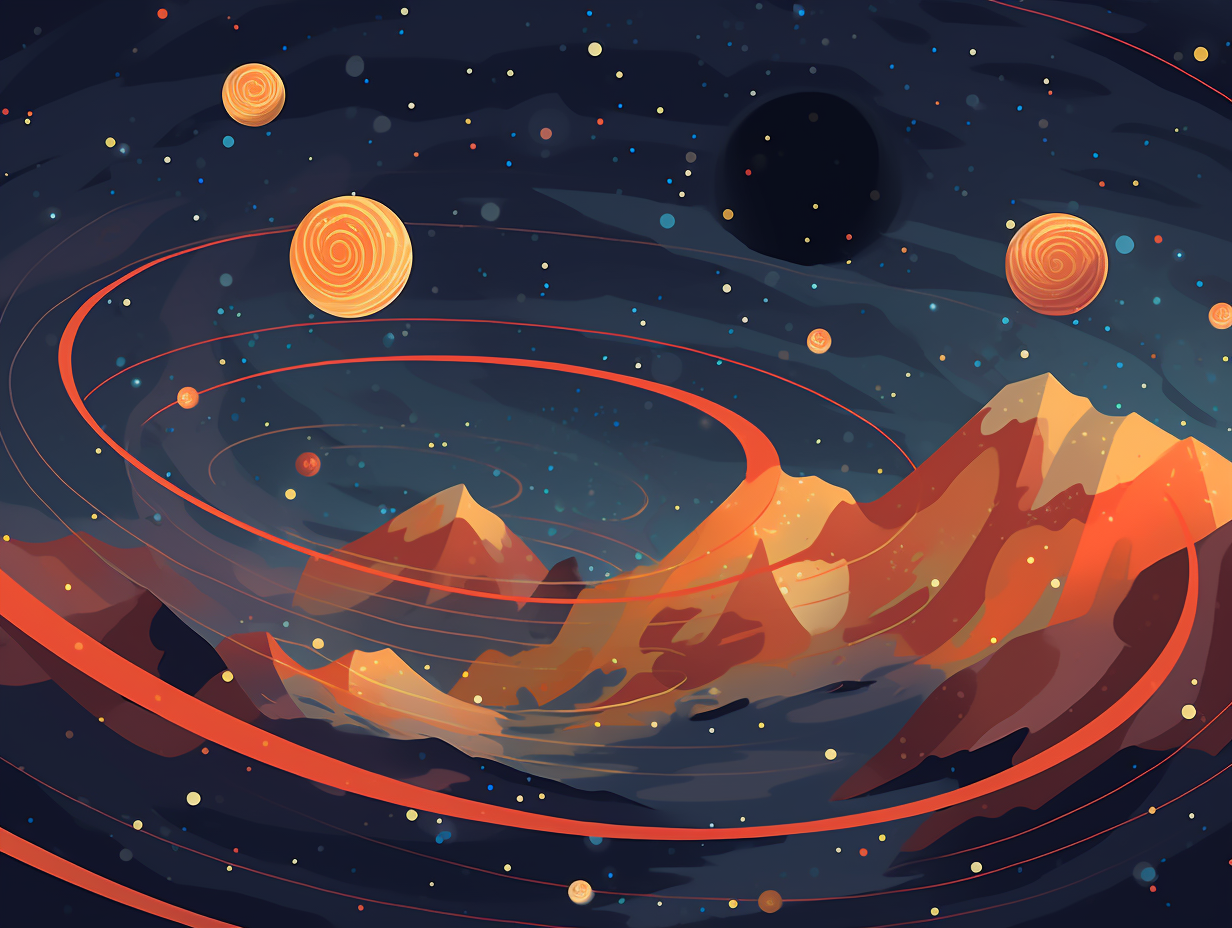Discover the Cosmos: Top 12 Fun Facts About Space Junk You Won't Believe!

1. Celestial Party Crashers
If the Earth were hosting a celestial party, space junk would undoubtedly be the uninvited guest who overstays their welcome, trashes the place, and poses a serious risk to the other attendees: Surprisingly, there are over 100 million pieces of space debris in orbit right now, and even objects as tiny as 1 mm can threaten vital spacecraft and Earth's ecosystems. Luckily, Privateer Space has responded with their aptly-named Wayfinder tool—an open-access, near real-time map of low Earth orbit objects—allowing space operators, academics, and the average Joe to track these potentially troublesome party crashers.
Source => cesium.com
2. Earth's Cosmic Garage Sale
Do you ever imagine Earth hosting the ultimate cosmic garage sale, getting rid of all that unwanted clutter orbiting the planet? Well, you might be onto something: As per the US Department of Defense's Space Surveillance Network, there are over 15,000 pieces of space debris larger than 4 inches being tracked, with potential threats to space exploration, satellites, and space stations. Fear not, though – companies like Astroscale and ClearSpace are devising missions for a much-needed space cleanup!
Source => businessinsider.in

Did you know the US military's Phoenix program creates cosmic lemonade by recycling defunct satellites and attaching them to nanosatellites, called "satlets"? 🛰️🍋 Discover how this ingenious process saves costs and transforms space debris!
=> Fun Facts about Satellites
3. Satellite Bumper Cars
When satellites play bumper cars in outer space, it can get a bit messy: In 2009, American communication satellite Iridium-33 and Russian military satellite Kosmos2251 had an accidental celestial fender bender at an eye-popping 11.7 km/s, resulting in over 2300 trackable fragments zooming around 776 km above Siberia—taking the concept of "breaking up is hard to do" to astronomical levels!
Source => esa.int
4. Crash-Preventing Superheroes
If outer space were hosting a never-ending garage sale, it'd have a bit of a clutter problem: Around 36,000 objects larger than 10 centimeters are floating about, with millions more smaller bits of debris joining the celestial jamboree. This space junk nation poses risks to satellites and manned missions, but fear not! A clever CNRS research team has cooked up a fast and reliable algorithm to determine collision risks in real time, already incorporated into satellite flight software. As we continue launching satellites (looking at you, Starlink and OneWeb), autonomous satellites and custom-tailored algorithms will be our crash-preventing superheroes.
Source => news.cnrs.fr

5. Stellar Fallout and Space Force
When an irate Chinese satellite and a ballistic missile had a "stellar" fallout: The 2007 collision of this explosive duo became the celestial world's largest debris field, with an outstanding 3,000 trackable pieces. This sky-high drama caused the Pentagon to rethink its approach to space, ultimately giving birth to the Space Force.
Source => airandspaceforces.com
6. Sputnikfest: Extraterrestrial Cheese Curds
When the stars align and Wisconsin cheese curds are dubbed extraterrestrial: a 20-pound piece of the Soviet satellite Sputnik IV crash-landed in Manitowoc, Wisconsin, in 1962, making it the only known piece of a Soviet spacecraft to ever land on American soil. The event is now commemorated every year at the zany Sputnikfest, complete with alien pet costumes, racing derbies, and a space debris-themed pageant.
Source => smithsonianmag.com
7. Earth's Dodgeball Game in Space
In Earth's own celestial game of dodgeball, we've certainly outdone ourselves with our 'orbital debris': Over 20,000 pieces of man-made material larger than a softball are currently playing dodge-and-weave in the Low Earth Orbit (LEO), causing quite a ruckus for space exploration and satellite technology.
Source => earth.com
8. SpaceX's Cluttered Frontier
Space: the final junkyard! These are the voyages of the not-so-starship SpaceX, whose ongoing mission is to boldly clutter space where no satellite has cluttered before: As of May 2022, there are 5,465 active satellites in orbit, a 12% increase in just six months, including nearly 4,000 operational Starlink broadband satellites launched by SpaceX since 2019. This cosmic clutter has forced the International Space Station to perform over 32 course corrections since 1999, dodging an interstellar game of debris dodgeball that heightens the risk of collisions for the ISS and other satellites.
Source => space.com
9. Mir's Crash Diet
When the Russian space station Mir decided to go on a crash diet and slim down all the way from 260,000 lbs to a fiery zero: On March 23, 2001, the 120,000 kg (260,000 lbs) hulking Mir space station plunged back to Earth in a carefully controlled descent, after being a celestial couch potato for 15 years in outer space.
Source => en.wikipedia.org

10. Cleanspace: The New Divine Frontier
Space Isn't Just for Stars, It's for Trash Too: NASA estimates that millions of pesky, pint-sized debris particles are zipping around Earth at a whopping 17,500 mph! These mini wrecking balls, some as minuscule as a chip of paint, can pack a punch equivalent to a bowling ball hurtling at 60 mph when colliding with spacecraft windows. To curb this orbital clutter, future satellites might have to take "cleanliness is next to godliness" quite literally, and self-eject out of orbit once they're past their prime.
Source => cracksat.net
11. Universe's Extreme Sports Arena
It's a bird, it's a plane, it's… baseball-sized space debris hurtling through the cosmos at breakneck speeds! It's safe to say the universe has its very own extreme sports arena out there: Over 23,000 chunks of debris larger than a baseball, half a million marble-sized pieces, and around 100 million millimeter-sized fragments are zooming at up to 27,000 kilometers per hour. This poses a significant threat to satellites and spacecraft sharing the Low Earth Orbit field, leading to concerns about the Kessler effect and efforts to find solutions to keep the sky from falling – or rather, crashing into vital equipment.
Source => solar-mems.com
12. Houston's Hoarding Problem
Houston, we have a hoarding problem: Our Earth is orbited by over 750,000 pieces of space debris, including defunct satellites and minuscule objects, all resulting from our unceasing ambitions for the final frontier and posing threats to future space exploration.
Source => scienceabc.com
Related Fun Facts




















